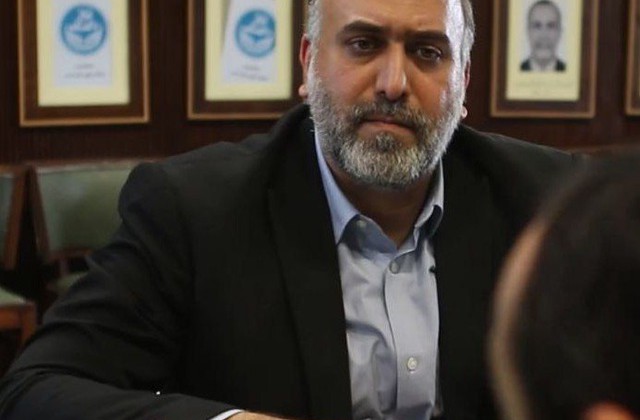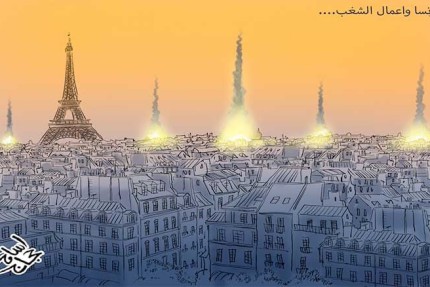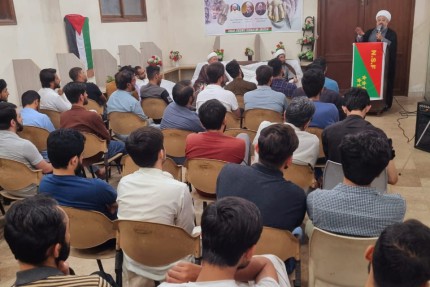Editor’s note
The Art of Soft Power: How Khomeini and Khamenei Used Words to Transform the World

Dr. Mohammad Ali Senobari Director and editor-in-chief of the New Vision Center for Strategic Studies :The Art of Soft Power: How Khomeini and Khamenei Used Words to Transform the World.
In modern history, few political leaders have matched the communicative prowess of Ayatollah Ruhollah Khomeini and Ayatollah Ali Khamenei. These architects of the Iranian Revolution and the Islamic Republic of Iran not only shaped their nation’s destiny but also projected their vision on global issues far beyond Iran’s borders. Their impassioned and logically grounded sermons resonated profoundly, both within and outside Iran, galvanizing a generation to rise and reshape the future. Their strategic use of written media allowed them to engage and influence diverse audiences worldwide, transforming the revolutionary narrative into a global discourse that captivated young people in the United States, Europe, and beyond.
Khomeini and Khamenei’s communication transcended mere rhetoric; it was a formidable tool for diplomacy and soft warfare. This “soft war” diverges from the colonialist concept; it utilizes dialogue and discourse to address global liberation issues and support the oppressed, regardless of their political, cultural, or religious orientation. Their messages adeptly addressed local aspirations and international concerns, showcasing a deep understanding of global dynamics. By harnessing the power of words, they challenged Western hegemony and presented an alternative worldview that resonated with marginalized communities globally. This dual impact—domestic mobilization and international influence—underscores their profound legacy. Their communications were not just about conveying information; they were about shifting perceptions and inspiring action, leaving lasting imprints on political and cultural landscapes worldwide.
The Strategic Importance of Cross-Border Dialogue
Khomeini and Khamenei’s influence over diverse audiences was no accident; it was a meticulously calculated strategy. They understood the immense power of public opinion and the necessity of engaging with it to support the struggle against colonialists and counter false Western narratives about the rights of oppressed peoples. This communication served multiple purposes: mobilizing support, countering hostile narratives, and positioning peoples as central players in global ideological and political arenas.
During the Iranian Revolution in 1979, Khomeini’s messages were pivotal in the Islamic Revolution’s success and the Shah’s overthrow. His widely circulated speeches and writings stirred public sentiment against the Shah’s regime. His seminal work, “Islamic Government,” articulated his vision of a state founded on both republicanism and Islamic principles. This dual foundation became the cornerstone of Iran’s unique political system, bolstered by unwavering popular support.
In January 1989, Khomeini wrote to Soviet leader Mikhail Gorbachev, advising him to consider Islam as a stable, strong alternative amid the Soviet Union’s impending collapse. This letter underscored Khomeini’s belief in the universal application of Islamic principles. His insightful predictions about the Soviet Union’s fall highlighted his profound understanding of political and moral systems, reinforcing his influence among Soviet and Western leaders. Gorbachev’s intriguing response—“At first, we tried to make Khomeini a communist, but now it seems we must become Muslims instead”—revealed the depth and impact of Khomeini’s messages.
Ayatollah Khamenei skillfully inherited and refined this influential communication through years of experience, particularly with young people in the West. In January 2015, Khamenei addressed youth in Europe and North America, urging them to seek an unbiased understanding of Islam. He criticized Western governments and media for perpetuating Islamophobia and emphasized the importance of independent research to bridge cultural and religious divides.
Khamenei’s messages to Western audiences often addressed themes of independence, justice, resistance to Western hegemony, and the Palestinian issue. By portraying Iran as a bulwark against imperialism, he resonated with groups critical of Western foreign policies. Khamenei frequently used his communication abilities to advocate for just causes worldwide, particularly the Palestinian issue and Gaza. In a message to Gaza supporters, he praised their stance against the “usurping Israeli entity” and highlighted their role in inspiring global action. He framed their struggle as part of a broader resistance against Zionist oppression, emphasizing the moral and historical righteousness of their cause.
Khamenei’s messages also condemned the US government’s hypocritical stance regarding Gaza’s atrocities, noting its continued support for Israel. He encouraged American students to draw strength from their teachers’ support, reassuring them that history was shifting in favor of the resistance front. He concluded by encouraging students to familiarize themselves with the Holy Qur’an, emphasizing its teachings as a guide toward eventual victory.
Building Bridges Between Cultures and Inspiring Change
The speeches of Ayatollah Ruhollah Khomeini and Ayatollah Ali Khamenei, rich with enthusiasm, logical arguments, and reality-based foundations, had a profound resonance both within Iran and internationally. One of the most significant positive impacts of these messages was their role in bridging cultural gaps. Khamenei’s outreach to Western youth has been particularly noteworthy, as his efforts to engage in dialogue and reduce misunderstandings about Islam have been widely praised. By directly addressing Western youth, Khamenei sought to transcend biased Western media representations and encourage a more accurate and comprehensive vision of Islam and Iran, facilitating deeper cultural understanding and mutual respect.
These messages also established new communication channels, opening paths for direct dialogue between the younger Western generation and Arab and Islamic communities. This initiative helped dismantle stereotypes and misunderstandings, promoting a more accurate and empathetic exchange of ideas. By creating these communication channels, Khomeini and Khamenei laid the foundation for a more connected and enlightened global society.
A distinctive feature of the leaders’ messages was their focus on the questions and concerns of Western youth regarding Islam, Iran, and the Palestinian issue. These messages, characterized by a friendly and sincere tone, were well received by many non-Muslims. By addressing these concerns head-on, Khomeini and Khamenei presented genuine perspectives on Islam, dispelling misconceptions and promoting a more enlightened understanding.
The messages also played a crucial role in stimulating critical thinking among young people. The Supreme Leader of the Revolution encouraged youth to critically examine Western narratives on major global issues, especially the Palestinian issue. This encouragement inspired many to challenge their preconceptions and seek more accurate information from original sources, enabling them to develop a more informed perspective on global editorial issues.
Moreover, the hopeful and idealistic tone of these messages resonated deeply with young people, inspiring them to strive for a more just and peaceful world. By providing a vision of a safer, more equitable world for Palestinians and other persecuted groups, the messages instilled a sense of purpose and motivation in their audiences.
Finally, the messages strengthened social movements in Europe and North America among both Muslim and non-Muslim youth. The hopeful and idealistic tone motivated these young people to fight for social justice and the rights of oppressed people worldwide. By encouraging activism and solidarity, the messages of Khomeini and Khamenei played a vital role in empowering the next generation to work toward a more just and equitable world.
In a world shaped by the power of words, Ayatollah Khomeini and Ayatollah Khamenei’s strategic communications transcended borders, inspiring movements and engaging people and youth worldwide. Their ability to connect with diverse audiences through compelling messages of justice and resistance has left an indelible mark on global discourse. As architects of revolutionary dialogue, they succeeded in bridging cultural divides and empowering a new generation to advocate for justice and support oppressed peoples worldwide.
Dr. Mohammad Ali Senobari Director and editor-in-chief of the New Vision Center for Strategic Studie
Comment
- Behind the Scene of the Attack in Oman, Operating Schemes that Intend to Destabilize the Country
- Trump’s Assassination Was a Ridiculous and Pre-organized Drama
- The Syrian senior analyst Views Towards the Letter of Iran’s President -Elect to the Secretary General of Hezbollah of Lebanon
- The hard way to political agreement in France/ Will Macron remain in power?
- Navigating the Caspian: Energy, Trade, and Geopolitical Harmony
- Behind the Scene of the Attack in Oman, Operating Schemes that Intend to Destabilize the Country
- Trump’s Assassination Was a Ridiculous and Pre-organized Drama
- The Syrian senior analyst Views Towards the Letter of Iran’s President -Elect to the Secretary General of Hezbollah of Lebanon
- The hard way to political agreement in France/ Will Macron remain in power?
- Navigating the Caspian: Energy, Trade, and Geopolitical Harmony
- Holding Public Court in Damascus to Put the Zionist Regime on Trial
- Boycotting Israeli Athletes for the Olympics in France Is Indispensable
- Iraqi Media Activists Arrested in Saudi Arabia/ Using the Hajj pilgrimage for settlement with the opponents
- Syrian Journalist and Author Tabib Ahmad Al-Darzi’s Analysis on Ali Bagheri’s Trip to Syria
- What Does it Mean on the Verge of Collapse and Has Israel Reached This Stage
- We Stand in an Era of Fundamental Changes/the World’s Political Literature is Changing
- The Art of Soft Power: How Khomeini and Khamenei Used Words to Transform the World
- Mey Sobhi Khansa’s views towards the Hague court verdict and the martyrdom of I R Iran president
- Behind the Scene of the Attack in Oman, Operating Schemes that Intend to Destabilize the Country
- Trump’s Assassination Was a Ridiculous and Pre-organized Drama
- The Syrian senior analyst Views Towards the Letter of Iran’s President -Elect to the Secretary General of Hezbollah of Lebanon
- The hard way to political agreement in France/ Will Macron remain in power?
- Navigating the Caspian: Energy, Trade, and Geopolitical Harmony
- Holding Public Court in Damascus to Put the Zionist Regime on Trial
- Boycotting Israeli Athletes for the Olympics in France Is Indispensable
- Iraqi Media Activists Arrested in Saudi Arabia/ Using the Hajj pilgrimage for settlement with the opponents
- Syrian Journalist and Author Tabib Ahmad Al-Darzi’s Analysis on Ali Bagheri’s Trip to Syria
- What Does it Mean on the Verge of Collapse and Has Israel Reached This Stage




